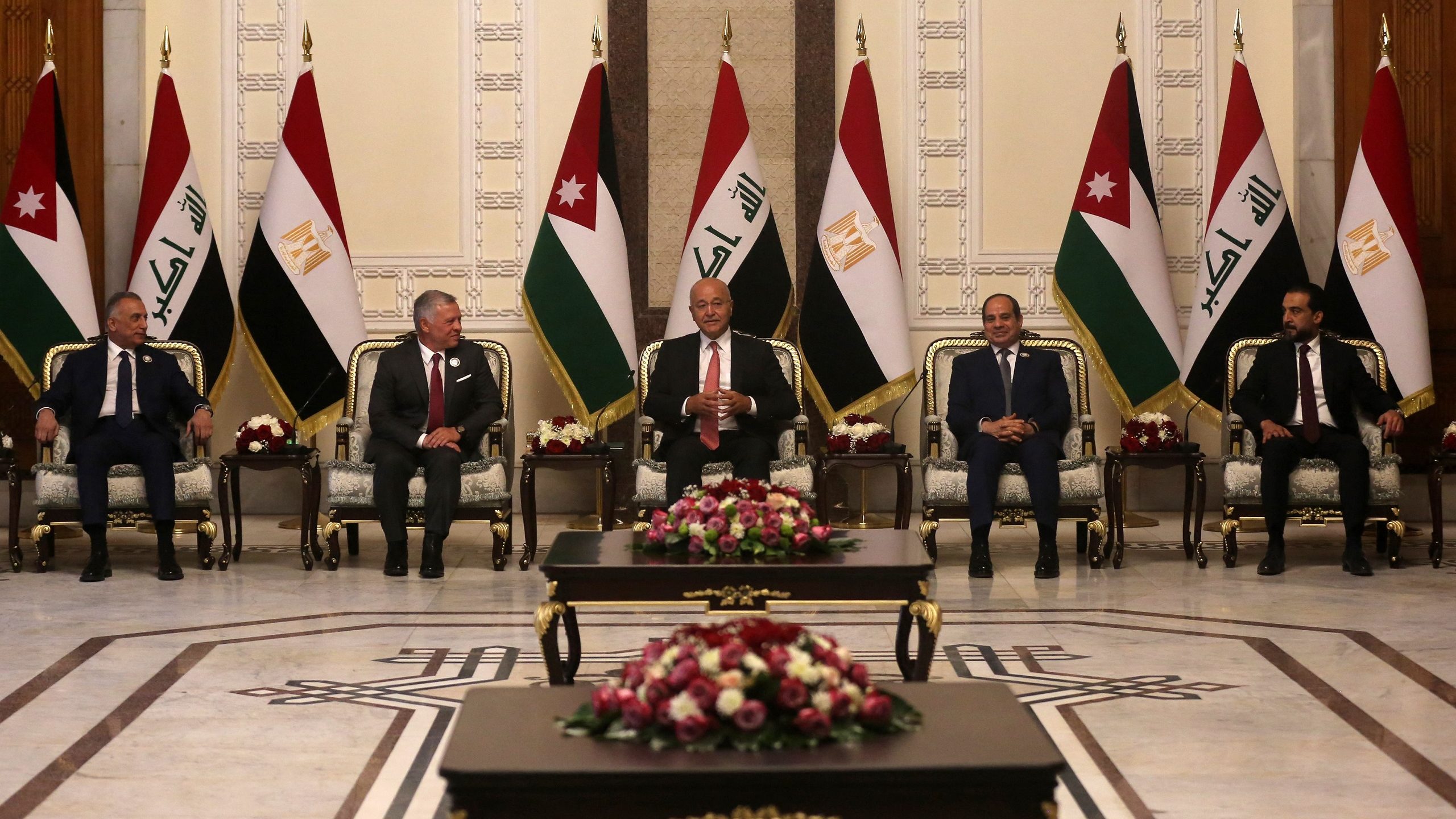Leaders of Iraq, Jordan and Egypt Meet to Cement Regional Economic Partnership
Tripartite summit includes focus on oil, electricity exchanges
[Amman] Leaders of three Arab nations met in Baghdad on Sunday with the aim of strengthening the relations between their countries. Egypt with its 100 million population provides a vast market for products, Iraq is a top oil producer and Jordan has surplus electricity that it can sell to its neighbors.
Iraqi President Barham Salih and a number of senior officials received Jordan’s King Abdullah II at the airport, where the monarch “expressed pride in the advanced relations between the two countries and peoples, underlining keenness to bolster ties across all fields.”
The king reaffirmed Jordan’s support for Iraq and its people in safeguarding their security and stability.
The two men “discussed the latest regional and international developments, foremost of which is the Palestinian cause, and agreed on the need to maintain close coordination and consultation on issues of mutual concern, in service of shared interests and Arab causes,” the Jordanian media reported.
Egyptian media hailed the participation of President Abdel Fattah el-Sisi as an achievement.
The summit is also meant to promote political consultations among the three countries concerning the challenges facing the Arab world and the Middle East region.
El-Sisi is scheduled to meet with Iraqi Prime Minister Mustafa al-Kadhimi on means of “bolstering bilateral ties, especially in the economic and trade scores. The two sides will also address a host of regional issues,” an Egyptian spokesman said.
Musa Shtewei, a professor of sociology at the University of Jordan, told The Media Line the regional efforts of the leaders of the three countries have both a comic and political aspect to them.
“On the economic level, which has precedence, there are mutual benefits in the energy sector, agriculture and transportation and there are a variety of investment opportunities in various areas. Politically this cements the historic relationship between the regional countries and at the same time it gives Iraq a chance to legitimize itself in the region and ultimately the world,” Shtewei said.
Amer Shobaki, an expert on oil and energy, says the Jordanian-Iraqi electrical interconnection project due to be completed by the end of 2022 will allow the kingdom to export 1,000 GWh (gigawatt-hours) of power to Iraq annually. This comes at a time when Iraq’s electric grid has been renewed and improved. Iraq needs 20 GW to solve its energy deficit.
On the other hand, the Basra-Sinai pipeline that will run from southern Iraq through Jordan to Egypt will allow the Mesopotamian nation to export much of the 7 million barrels of oil it can produce on a daily basis.
Currently, Iraq is producing 3 million barrels a day, making it the second-largest oil exporter after Saudi Arabia. Oil revenues cover 90% of Iraq’s budgetary needs.
Jordan imports 150,000 barrels a day while Egypt imports 20% of its needs, which total 900,000 barrels a day. Egypt currently imports 2 million barrels a month from Kuwait and the rest of its needs from Saudi Aramco and the United Arab Emirates. Jordan and Egypt are part of two free trade zone agreements, with trade under those agreements reaching $1.2 billion annually.
Jordan’s Prime Minister Bisher Khasawneh, Deputy Prime Minister and Foreign Minister Ayman Safadi and General Intelligence Department Director Maj. Gen. Ahmad Husni attended the meeting.
Absent from the meeting was Jordan’s energy minister, who was fiercely attacked recently for a power shortage in the national grid that paralyzed the country for five hours. Minister of Energy and Mineral Resources Hala Zawati said during a press briefing at the Prime Minister’s Office in Amman on May 21 that the “electricity blackout was caused by a technical malfunction in the Jordanian-Egyptian electricity interconnection, resulting in an outage in high-voltage grids leading to the widespread power outage in the kingdom.”
Sunday’s tripartite summit, the fourth of its kind, had been delayed due to recent Palestinian-Israeli violence.
During the second such summit, in September 2019, el-Sisi, Abdullah and Salih asserted their full support for the Palestinian cause as a central issue in the Arab world, adding the Palestinian people must have all their legitimate rights that include an independent state with its capital in Jerusalem in light of the Arab Peace Initiative and international agreements.
Adnan Abu Odeh, a former adviser to King Hussein and King Abdullah, told The Media Line the long-term purpose of these repeated summits is unclear.
“It has either a political or economic goal, or both. If it is economic then it is welcome, because we [in Jordan] badly need economic support,” he said.
Abu Odeh wondered whether there would be discussion about building a railway line between Iraq and Jordan in addition to the oil pipeline under construction.
Salameh Darawi, a journalist who specializes in economic issues, told The Media Line there are areas of cooperation that all parties can benefit from.
“There are possibilities with a complementary nature in areas such as energy and industrial production,” he said.
Darawi noted that Jordan has a free trade area with many countries, including the lucrative American market, and he expects that a free trade zone will be established near the Jordan-Iraq border set for exports to the US and other countries.


